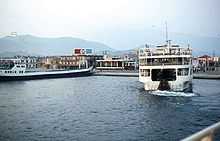Antirrio
| Antirrio Αντίρριο | |
|---|---|
 The Castle of Antirrio | |
| Location | |
 Antirrio | |
| Coordinates | 38°20′N 21°46′E / 38.333°N 21.767°ECoordinates: 38°20′N 21°46′E / 38.333°N 21.767°E |
Location within the regional unit  | |
| Government | |
| Country: | Greece |
| Administrative region: | West Greece |
| Regional unit: | Aetolia-Acarnania |
| Municipality: | Nafpaktia |
| Population statistics (as of 2001)[1] | |
| Municipal unit | |
| - Population: | 2,375 |
| - Area: | 50.8 km2 (20 sq mi) |
| - Density: | 47 /km2 (121 /sq mi) |
| Other | |
| Time zone: | EET/EEST (UTC+2/3) |
| Elevation (center): | 1 m (3 ft) |
| Postal code: | 300 20 |
| Telephone: | 26340 |
| Auto: | ME |
Antirrio (Greek: Modern, Αντίρριο, pronounced [aˈndirio], Ancient/Katharevousa: Antirrhion, Latin: Antirrhium) is a former municipality in Aetolia-Acarnania, West Greece, Greece. Since the 2011 local government reform it is part of the municipality Nafpaktia, of which it is a municipal unit.[2] It is situated on a cape which separates the Gulf of Patras in the west from the Gulf of Corinth in the east. Since August 2004 the Rio–Antirrio bridge connects northwestern Greece with the Peloponnese, across the narrow (2.4 km) Strait of Rio. The name Antirrio means "opposite Rio". Antirrio is now bypassed to the northeast with GR-5/E55 with a junction 2 km north with GR-48/E65 (Amfissa - Antirrio). Antirrio is about 10 km ENE of Patras, about 209 km W of Athens and NW of Aigio, WSW of Amfissa, SW of Nafpaktos, E of Messolonghi and SE of Agrinio.
Subdivisions
The municipal unit Antirrio is subdivided into the following communities (constituent villages in brackets):
- Antirrio (Antirrio, Karaoulia, Myrtia, Spartorachi)
- Makyneia (Makyneia, Agios Polykarpos, Agrapidokampos, Riza)
- Molykreio (Molykreio, Ano Platanitis, Fragkaiika)
Geography
The community has a school, a gymnasium, a church, a post office, a beach, and a square (plateia). Residential houses are lined up with the highway and the shoreline. The area is surrounded by farmland in the north and northeast and forests in the northwest.

The Port of Antirrio where ferry services began in the 1960s carrying vehicles from the Peloponnese to the Mainland Greece. It was not the only harbor carrying vehicles in the area. Ferry services was almost eliminated when the new Rio-Antirrio bridge opened. It was reduced to mainly vehicles that are not allowed on the bridge.
The highway is now bypassed and has tolls in the eastern part. The junction with GR-48 (Antirrio - Amfissa) was slightly west of the village.
Adjacent to the port is a lighthouse and the fortress of Antirrio.
Paliovouna mountain is located at the northwest of the town, elevating at around 1,100 m. It is closely shaped like a pyramid and it has many streams. The ridges' width is longer from north to south and the southwestern part is passed by GR-5 at 100 m above sea level. The other is in the north which is around 500 to 600 m and is mainly grassy and forested. A valley is located north of Antirrio and some farms are in the southern half of that mountain especially where the boundary with Nafpaktos are located.
Historical population
| Year | Municipal district | Municipality |
|---|---|---|
| 1981 | 916 | - |
| 1991 | 676 | 2,531 |
| 2001 | 1,100 | - |
References
- ↑ De Facto Population of Greece Population and Housing Census of March 18th, 2001 (PDF 793 KB). National Statistical Service of Greece. 2003.
- ↑ Kallikratis law Greece Ministry of Interior (Greek)
External links
- Municipality of Antirrio (Greek)
- http://www.qsl.net/sv2ael/sv2ael.files/faroi/details/antirio.htm - Lighthouse
- GTP - Antirrio
- GTP - Municipal unit of Antirrio
See also
 |
Naupactus |  | ||
| Chalkeia | |
Gulf of Corinth | ||
| ||||
| | ||||
| Gulf of Patras |
| ||||||||||||||||||||